Sociology Report: NACCHO Pilot Program and Aboriginal Health
VerifiedAdded on 2022/11/16
|7
|1514
|302
Report
AI Summary
This sociology report provides a comprehensive analysis of Aboriginal health in Australia, specifically examining the National Aboriginal Community Controlled Health Organization (NACCHO) pilot program. The report delves into the professional standpoint of a project officer, emphasizing the need to address health disparities between Aboriginal and non-Aboriginal populations. It explores social, institutional, and historical factors influencing the project, including the establishment and function of NACCHO, ethical considerations such as informed consent and cultural sensitivity, and the historical context of Aboriginal health services. Furthermore, the report outlines principles for establishing collaborative partnerships with the indigenous community, emphasizing cultural competency, clear communication, and the involvement of Aboriginal people in decision-making processes. The author highlights the importance of addressing power inequalities and ensuring effective conflict resolution to build sustainable and respectful relationships. The report draws on various sources, including research papers and organizational websites, to support its arguments and provide a nuanced understanding of the complexities surrounding Aboriginal health and healthcare in Australia.
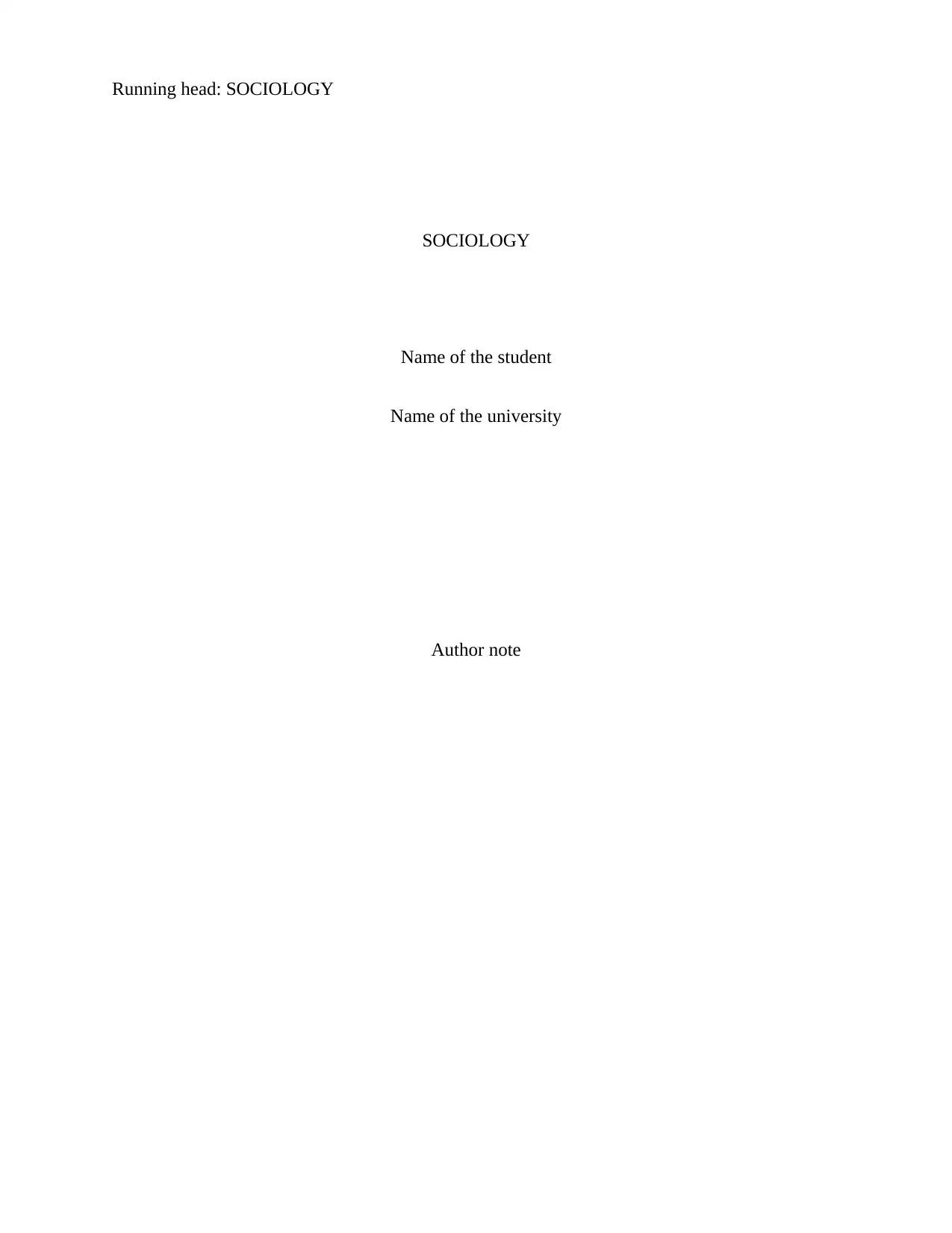
Running head: SOCIOLOGY
SOCIOLOGY
Name of the student
Name of the university
Author note
SOCIOLOGY
Name of the student
Name of the university
Author note
Paraphrase This Document
Need a fresh take? Get an instant paraphrase of this document with our AI Paraphraser
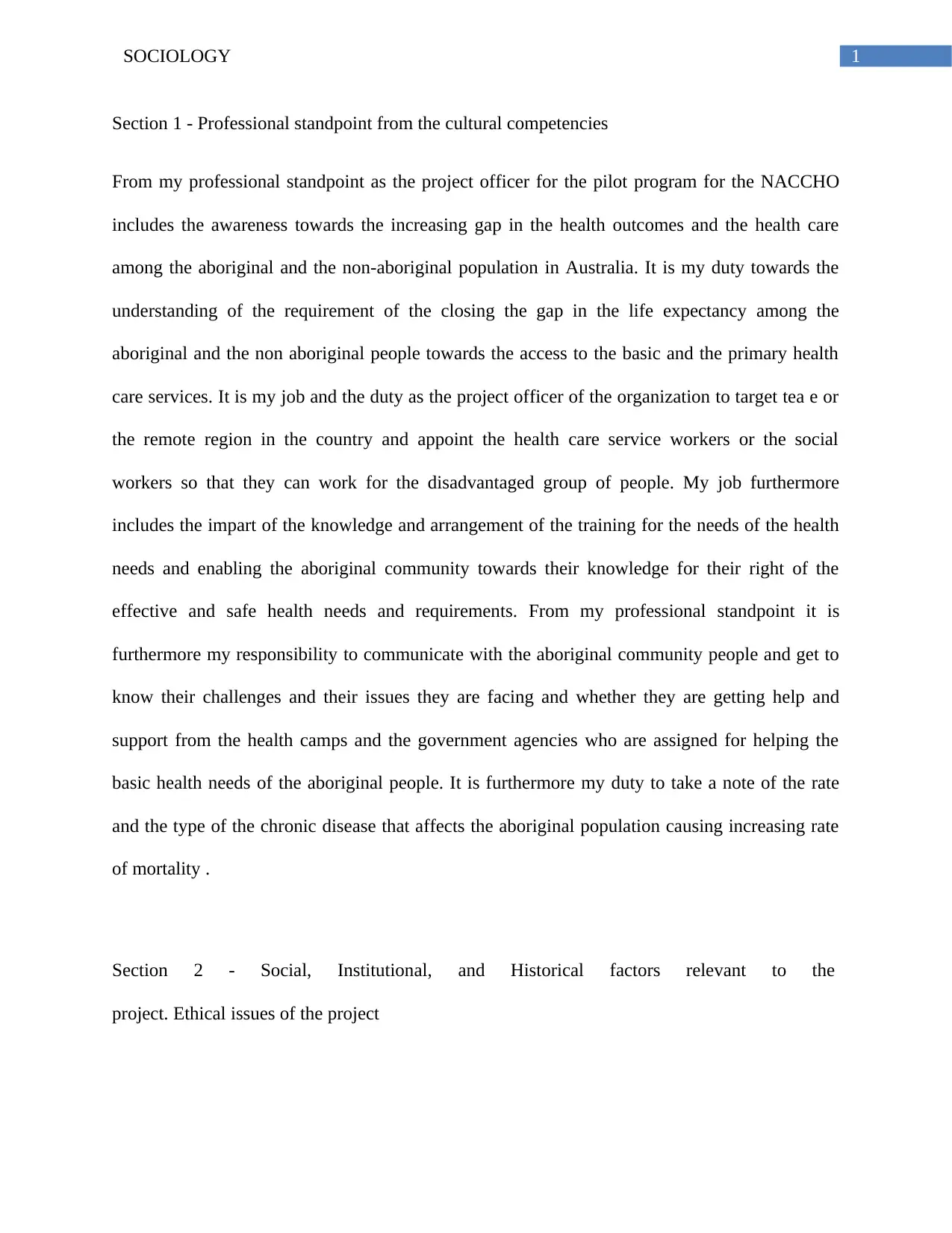
SOCIOLOGY 1
Section 1 - Professional standpoint from the cultural competencies
From my professional standpoint as the project officer for the pilot program for the NACCHO
includes the awareness towards the increasing gap in the health outcomes and the health care
among the aboriginal and the non-aboriginal population in Australia. It is my duty towards the
understanding of the requirement of the closing the gap in the life expectancy among the
aboriginal and the non aboriginal people towards the access to the basic and the primary health
care services. It is my job and the duty as the project officer of the organization to target tea e or
the remote region in the country and appoint the health care service workers or the social
workers so that they can work for the disadvantaged group of people. My job furthermore
includes the impart of the knowledge and arrangement of the training for the needs of the health
needs and enabling the aboriginal community towards their knowledge for their right of the
effective and safe health needs and requirements. From my professional standpoint it is
furthermore my responsibility to communicate with the aboriginal community people and get to
know their challenges and their issues they are facing and whether they are getting help and
support from the health camps and the government agencies who are assigned for helping the
basic health needs of the aboriginal people. It is furthermore my duty to take a note of the rate
and the type of the chronic disease that affects the aboriginal population causing increasing rate
of mortality .
Section 2 - Social, Institutional, and Historical factors relevant to the
project. Ethical issues of the project
Section 1 - Professional standpoint from the cultural competencies
From my professional standpoint as the project officer for the pilot program for the NACCHO
includes the awareness towards the increasing gap in the health outcomes and the health care
among the aboriginal and the non-aboriginal population in Australia. It is my duty towards the
understanding of the requirement of the closing the gap in the life expectancy among the
aboriginal and the non aboriginal people towards the access to the basic and the primary health
care services. It is my job and the duty as the project officer of the organization to target tea e or
the remote region in the country and appoint the health care service workers or the social
workers so that they can work for the disadvantaged group of people. My job furthermore
includes the impart of the knowledge and arrangement of the training for the needs of the health
needs and enabling the aboriginal community towards their knowledge for their right of the
effective and safe health needs and requirements. From my professional standpoint it is
furthermore my responsibility to communicate with the aboriginal community people and get to
know their challenges and their issues they are facing and whether they are getting help and
support from the health camps and the government agencies who are assigned for helping the
basic health needs of the aboriginal people. It is furthermore my duty to take a note of the rate
and the type of the chronic disease that affects the aboriginal population causing increasing rate
of mortality .
Section 2 - Social, Institutional, and Historical factors relevant to the
project. Ethical issues of the project
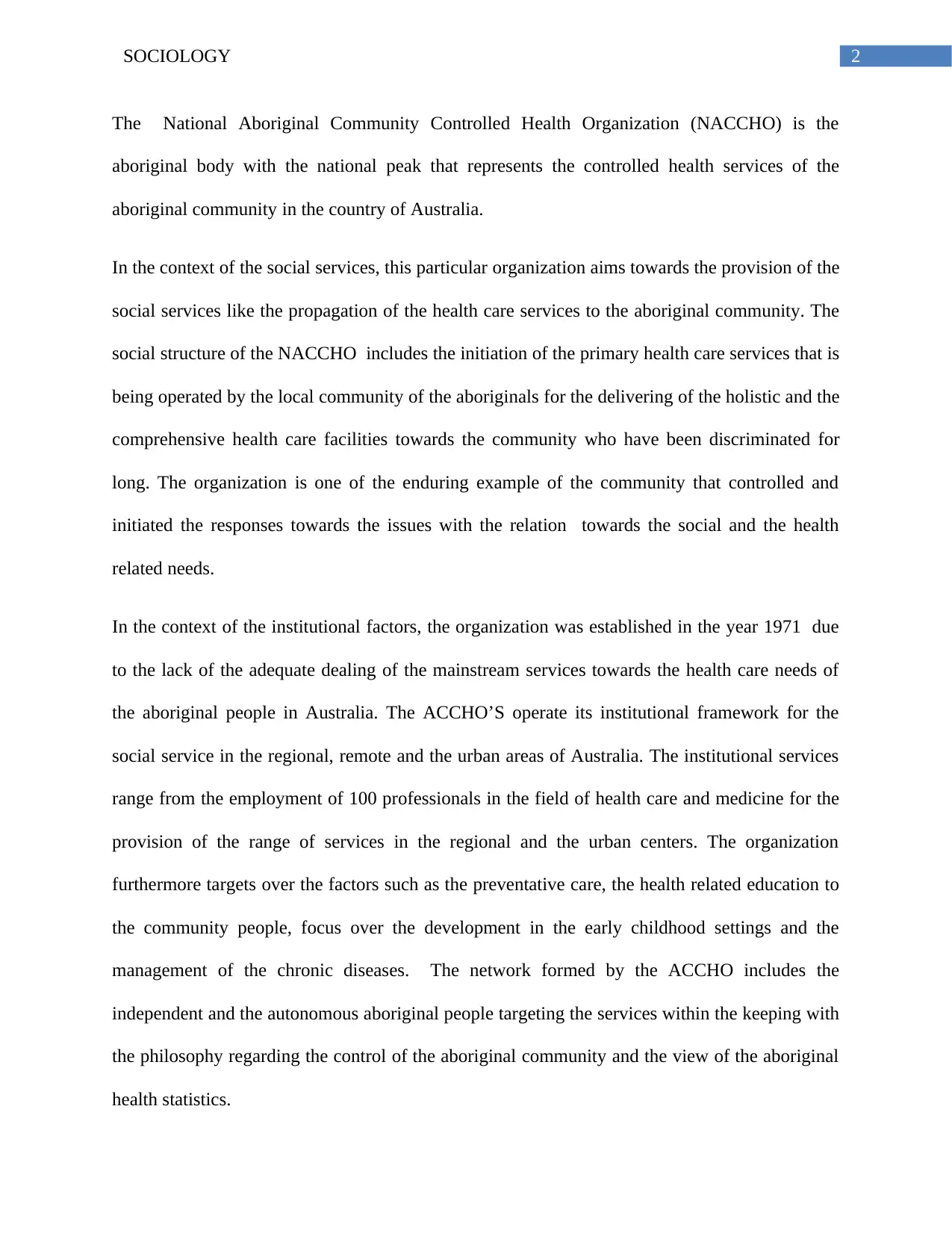
2SOCIOLOGY
The National Aboriginal Community Controlled Health Organization (NACCHO) is the
aboriginal body with the national peak that represents the controlled health services of the
aboriginal community in the country of Australia.
In the context of the social services, this particular organization aims towards the provision of the
social services like the propagation of the health care services to the aboriginal community. The
social structure of the NACCHO includes the initiation of the primary health care services that is
being operated by the local community of the aboriginals for the delivering of the holistic and the
comprehensive health care facilities towards the community who have been discriminated for
long. The organization is one of the enduring example of the community that controlled and
initiated the responses towards the issues with the relation towards the social and the health
related needs.
In the context of the institutional factors, the organization was established in the year 1971 due
to the lack of the adequate dealing of the mainstream services towards the health care needs of
the aboriginal people in Australia. The ACCHO’S operate its institutional framework for the
social service in the regional, remote and the urban areas of Australia. The institutional services
range from the employment of 100 professionals in the field of health care and medicine for the
provision of the range of services in the regional and the urban centers. The organization
furthermore targets over the factors such as the preventative care, the health related education to
the community people, focus over the development in the early childhood settings and the
management of the chronic diseases. The network formed by the ACCHO includes the
independent and the autonomous aboriginal people targeting the services within the keeping with
the philosophy regarding the control of the aboriginal community and the view of the aboriginal
health statistics.
The National Aboriginal Community Controlled Health Organization (NACCHO) is the
aboriginal body with the national peak that represents the controlled health services of the
aboriginal community in the country of Australia.
In the context of the social services, this particular organization aims towards the provision of the
social services like the propagation of the health care services to the aboriginal community. The
social structure of the NACCHO includes the initiation of the primary health care services that is
being operated by the local community of the aboriginals for the delivering of the holistic and the
comprehensive health care facilities towards the community who have been discriminated for
long. The organization is one of the enduring example of the community that controlled and
initiated the responses towards the issues with the relation towards the social and the health
related needs.
In the context of the institutional factors, the organization was established in the year 1971 due
to the lack of the adequate dealing of the mainstream services towards the health care needs of
the aboriginal people in Australia. The ACCHO’S operate its institutional framework for the
social service in the regional, remote and the urban areas of Australia. The institutional services
range from the employment of 100 professionals in the field of health care and medicine for the
provision of the range of services in the regional and the urban centers. The organization
furthermore targets over the factors such as the preventative care, the health related education to
the community people, focus over the development in the early childhood settings and the
management of the chronic diseases. The network formed by the ACCHO includes the
independent and the autonomous aboriginal people targeting the services within the keeping with
the philosophy regarding the control of the aboriginal community and the view of the aboriginal
health statistics.
⊘ This is a preview!⊘
Do you want full access?
Subscribe today to unlock all pages.

Trusted by 1+ million students worldwide
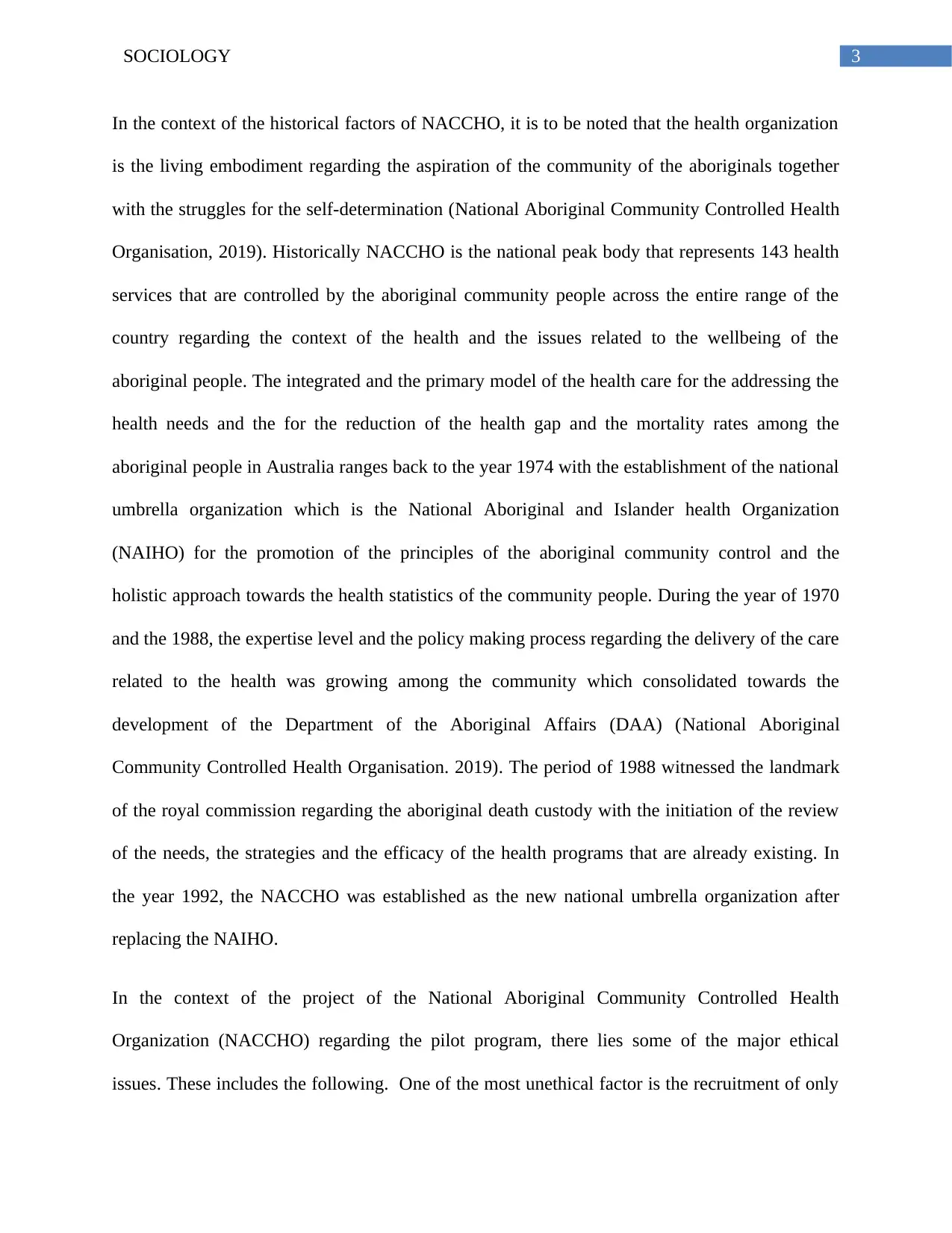
3SOCIOLOGY
In the context of the historical factors of NACCHO, it is to be noted that the health organization
is the living embodiment regarding the aspiration of the community of the aboriginals together
with the struggles for the self-determination (National Aboriginal Community Controlled Health
Organisation, 2019). Historically NACCHO is the national peak body that represents 143 health
services that are controlled by the aboriginal community people across the entire range of the
country regarding the context of the health and the issues related to the wellbeing of the
aboriginal people. The integrated and the primary model of the health care for the addressing the
health needs and the for the reduction of the health gap and the mortality rates among the
aboriginal people in Australia ranges back to the year 1974 with the establishment of the national
umbrella organization which is the National Aboriginal and Islander health Organization
(NAIHO) for the promotion of the principles of the aboriginal community control and the
holistic approach towards the health statistics of the community people. During the year of 1970
and the 1988, the expertise level and the policy making process regarding the delivery of the care
related to the health was growing among the community which consolidated towards the
development of the Department of the Aboriginal Affairs (DAA) (National Aboriginal
Community Controlled Health Organisation. 2019). The period of 1988 witnessed the landmark
of the royal commission regarding the aboriginal death custody with the initiation of the review
of the needs, the strategies and the efficacy of the health programs that are already existing. In
the year 1992, the NACCHO was established as the new national umbrella organization after
replacing the NAIHO.
In the context of the project of the National Aboriginal Community Controlled Health
Organization (NACCHO) regarding the pilot program, there lies some of the major ethical
issues. These includes the following. One of the most unethical factor is the recruitment of only
In the context of the historical factors of NACCHO, it is to be noted that the health organization
is the living embodiment regarding the aspiration of the community of the aboriginals together
with the struggles for the self-determination (National Aboriginal Community Controlled Health
Organisation, 2019). Historically NACCHO is the national peak body that represents 143 health
services that are controlled by the aboriginal community people across the entire range of the
country regarding the context of the health and the issues related to the wellbeing of the
aboriginal people. The integrated and the primary model of the health care for the addressing the
health needs and the for the reduction of the health gap and the mortality rates among the
aboriginal people in Australia ranges back to the year 1974 with the establishment of the national
umbrella organization which is the National Aboriginal and Islander health Organization
(NAIHO) for the promotion of the principles of the aboriginal community control and the
holistic approach towards the health statistics of the community people. During the year of 1970
and the 1988, the expertise level and the policy making process regarding the delivery of the care
related to the health was growing among the community which consolidated towards the
development of the Department of the Aboriginal Affairs (DAA) (National Aboriginal
Community Controlled Health Organisation. 2019). The period of 1988 witnessed the landmark
of the royal commission regarding the aboriginal death custody with the initiation of the review
of the needs, the strategies and the efficacy of the health programs that are already existing. In
the year 1992, the NACCHO was established as the new national umbrella organization after
replacing the NAIHO.
In the context of the project of the National Aboriginal Community Controlled Health
Organization (NACCHO) regarding the pilot program, there lies some of the major ethical
issues. These includes the following. One of the most unethical factor is the recruitment of only
Paraphrase This Document
Need a fresh take? Get an instant paraphrase of this document with our AI Paraphraser
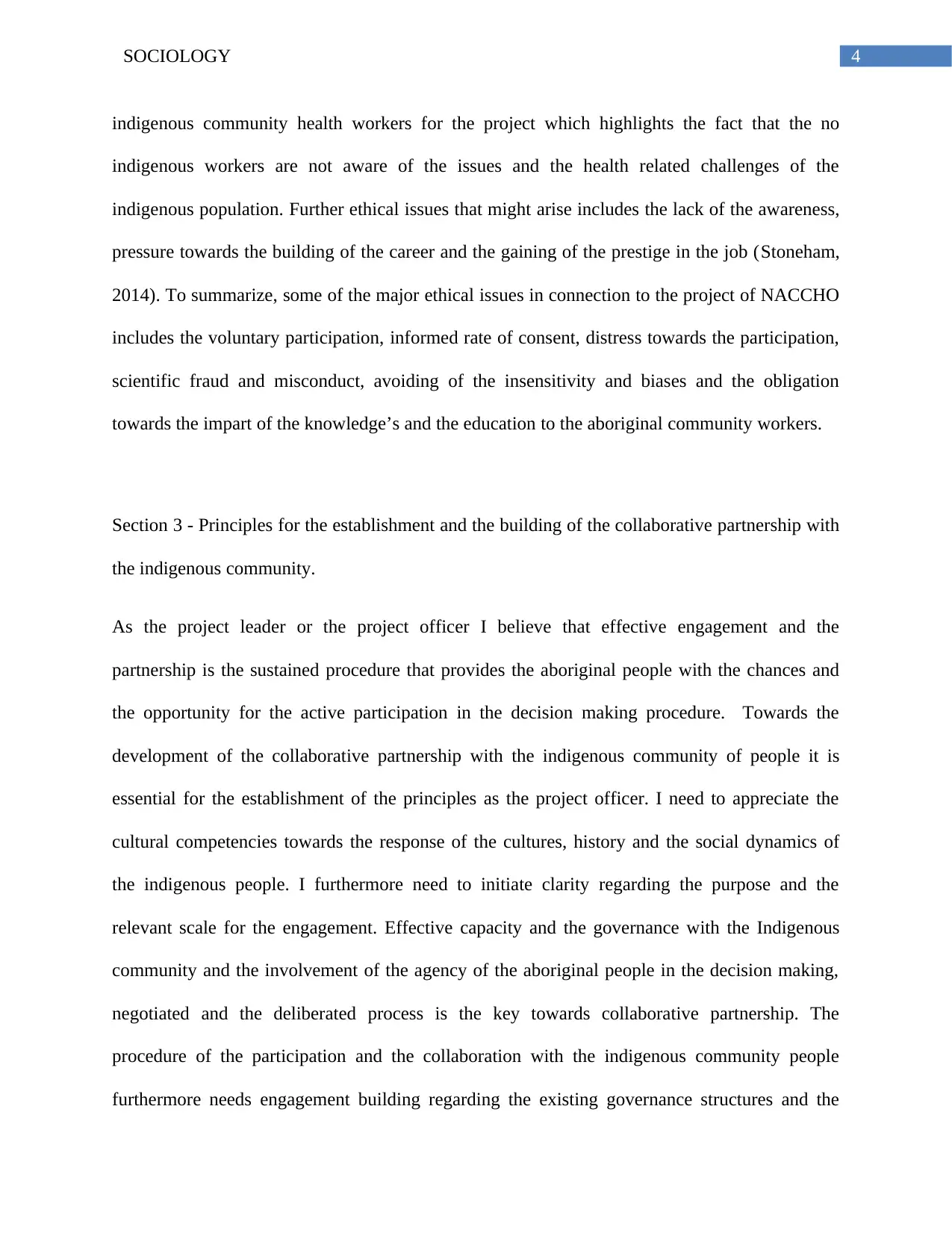
4SOCIOLOGY
indigenous community health workers for the project which highlights the fact that the no
indigenous workers are not aware of the issues and the health related challenges of the
indigenous population. Further ethical issues that might arise includes the lack of the awareness,
pressure towards the building of the career and the gaining of the prestige in the job (Stoneham,
2014). To summarize, some of the major ethical issues in connection to the project of NACCHO
includes the voluntary participation, informed rate of consent, distress towards the participation,
scientific fraud and misconduct, avoiding of the insensitivity and biases and the obligation
towards the impart of the knowledge’s and the education to the aboriginal community workers.
Section 3 - Principles for the establishment and the building of the collaborative partnership with
the indigenous community.
As the project leader or the project officer I believe that effective engagement and the
partnership is the sustained procedure that provides the aboriginal people with the chances and
the opportunity for the active participation in the decision making procedure. Towards the
development of the collaborative partnership with the indigenous community of people it is
essential for the establishment of the principles as the project officer. I need to appreciate the
cultural competencies towards the response of the cultures, history and the social dynamics of
the indigenous people. I furthermore need to initiate clarity regarding the purpose and the
relevant scale for the engagement. Effective capacity and the governance with the Indigenous
community and the involvement of the agency of the aboriginal people in the decision making,
negotiated and the deliberated process is the key towards collaborative partnership. The
procedure of the participation and the collaboration with the indigenous community people
furthermore needs engagement building regarding the existing governance structures and the
indigenous community health workers for the project which highlights the fact that the no
indigenous workers are not aware of the issues and the health related challenges of the
indigenous population. Further ethical issues that might arise includes the lack of the awareness,
pressure towards the building of the career and the gaining of the prestige in the job (Stoneham,
2014). To summarize, some of the major ethical issues in connection to the project of NACCHO
includes the voluntary participation, informed rate of consent, distress towards the participation,
scientific fraud and misconduct, avoiding of the insensitivity and biases and the obligation
towards the impart of the knowledge’s and the education to the aboriginal community workers.
Section 3 - Principles for the establishment and the building of the collaborative partnership with
the indigenous community.
As the project leader or the project officer I believe that effective engagement and the
partnership is the sustained procedure that provides the aboriginal people with the chances and
the opportunity for the active participation in the decision making procedure. Towards the
development of the collaborative partnership with the indigenous community of people it is
essential for the establishment of the principles as the project officer. I need to appreciate the
cultural competencies towards the response of the cultures, history and the social dynamics of
the indigenous people. I furthermore need to initiate clarity regarding the purpose and the
relevant scale for the engagement. Effective capacity and the governance with the Indigenous
community and the involvement of the agency of the aboriginal people in the decision making,
negotiated and the deliberated process is the key towards collaborative partnership. The
procedure of the participation and the collaboration with the indigenous community people
furthermore needs engagement building regarding the existing governance structures and the
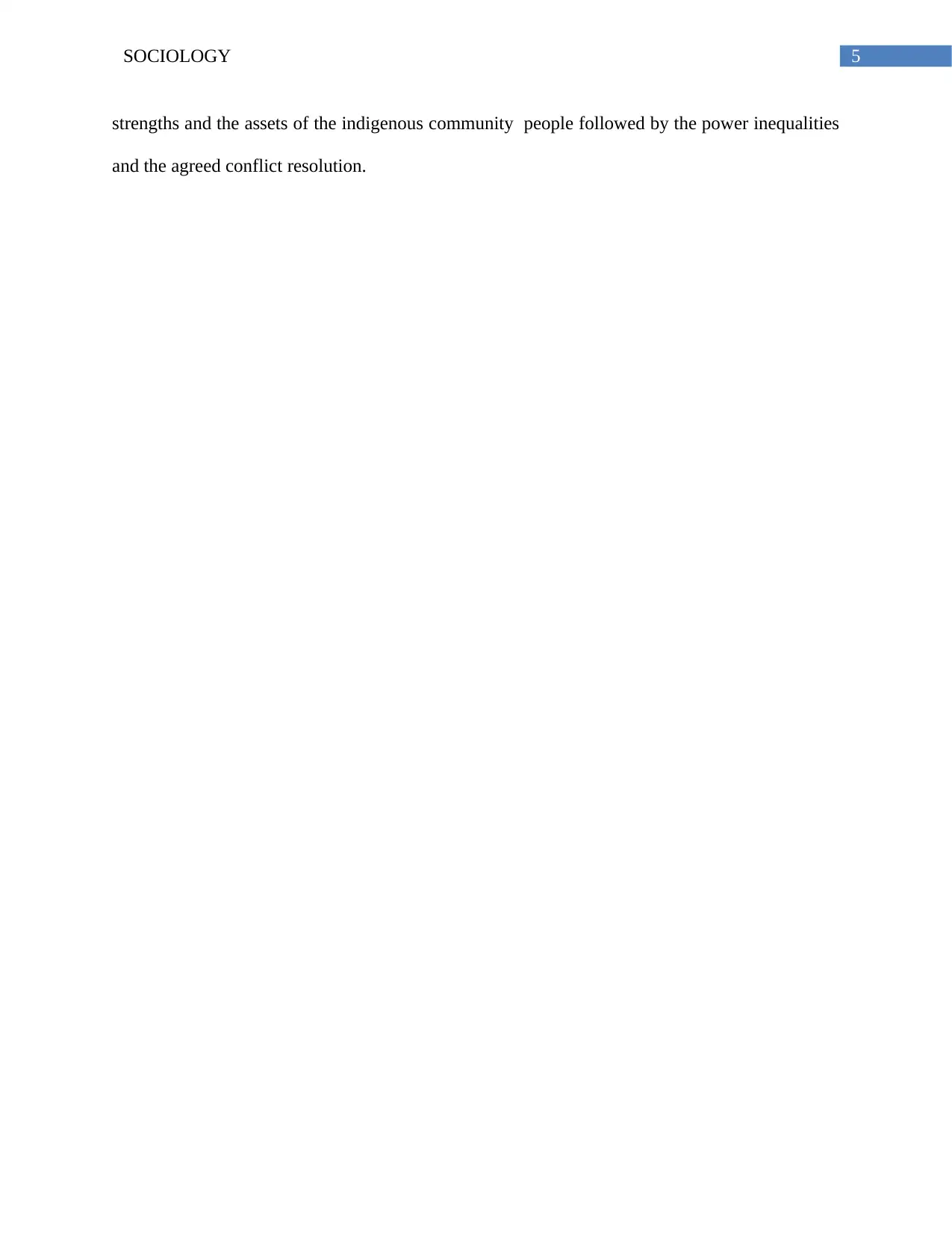
5SOCIOLOGY
strengths and the assets of the indigenous community people followed by the power inequalities
and the agreed conflict resolution.
strengths and the assets of the indigenous community people followed by the power inequalities
and the agreed conflict resolution.
⊘ This is a preview!⊘
Do you want full access?
Subscribe today to unlock all pages.

Trusted by 1+ million students worldwide
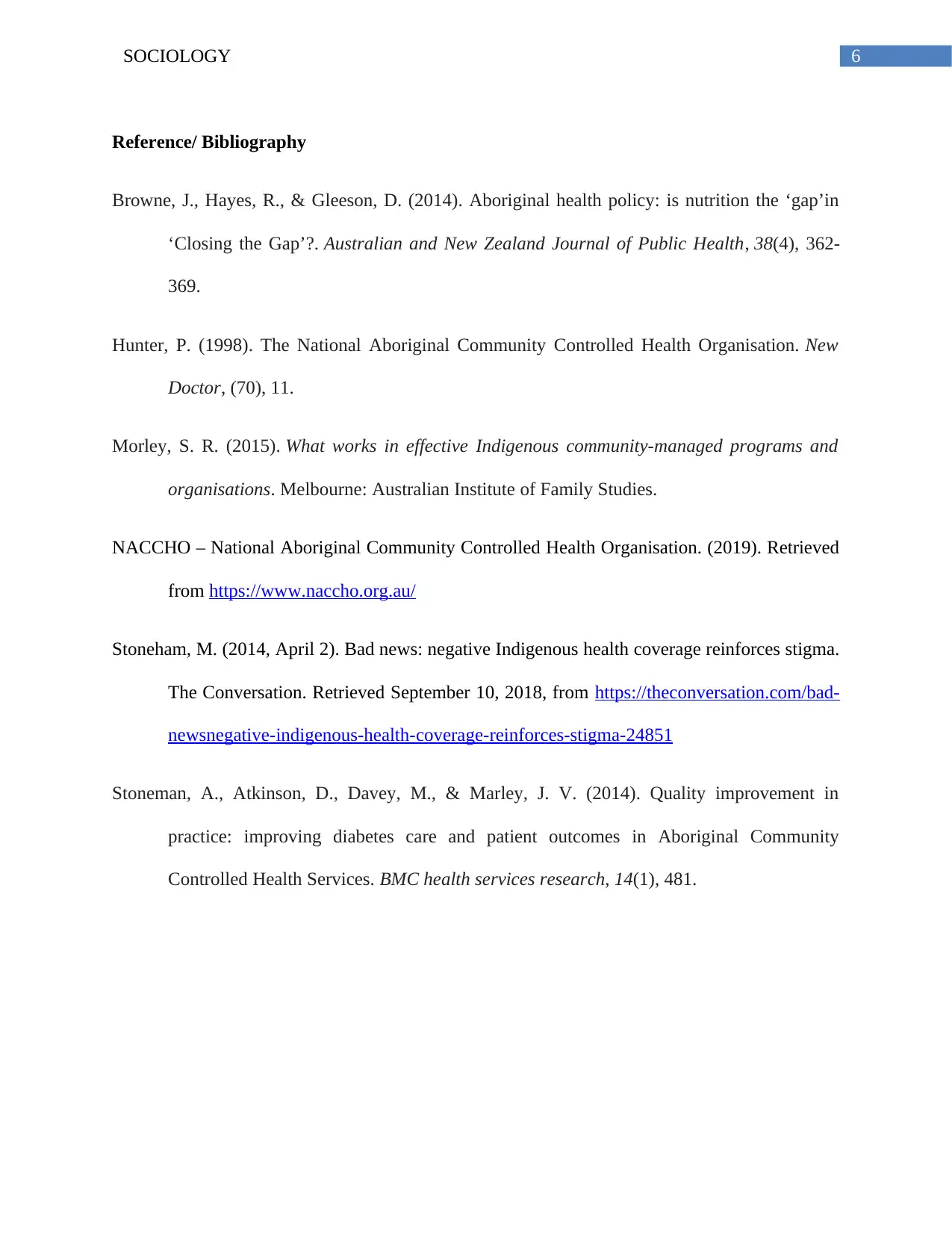
6SOCIOLOGY
Reference/ Bibliography
Browne, J., Hayes, R., & Gleeson, D. (2014). Aboriginal health policy: is nutrition the ‘gap’in
‘Closing the Gap’?. Australian and New Zealand Journal of Public Health, 38(4), 362-
369.
Hunter, P. (1998). The National Aboriginal Community Controlled Health Organisation. New
Doctor, (70), 11.
Morley, S. R. (2015). What works in effective Indigenous community-managed programs and
organisations. Melbourne: Australian Institute of Family Studies.
NACCHO – National Aboriginal Community Controlled Health Organisation. (2019). Retrieved
from https://www.naccho.org.au/
Stoneham, M. (2014, April 2). Bad news: negative Indigenous health coverage reinforces stigma.
The Conversation. Retrieved September 10, 2018, from https://theconversation.com/bad-
newsnegative-indigenous-health-coverage-reinforces-stigma-24851
Stoneman, A., Atkinson, D., Davey, M., & Marley, J. V. (2014). Quality improvement in
practice: improving diabetes care and patient outcomes in Aboriginal Community
Controlled Health Services. BMC health services research, 14(1), 481.
Reference/ Bibliography
Browne, J., Hayes, R., & Gleeson, D. (2014). Aboriginal health policy: is nutrition the ‘gap’in
‘Closing the Gap’?. Australian and New Zealand Journal of Public Health, 38(4), 362-
369.
Hunter, P. (1998). The National Aboriginal Community Controlled Health Organisation. New
Doctor, (70), 11.
Morley, S. R. (2015). What works in effective Indigenous community-managed programs and
organisations. Melbourne: Australian Institute of Family Studies.
NACCHO – National Aboriginal Community Controlled Health Organisation. (2019). Retrieved
from https://www.naccho.org.au/
Stoneham, M. (2014, April 2). Bad news: negative Indigenous health coverage reinforces stigma.
The Conversation. Retrieved September 10, 2018, from https://theconversation.com/bad-
newsnegative-indigenous-health-coverage-reinforces-stigma-24851
Stoneman, A., Atkinson, D., Davey, M., & Marley, J. V. (2014). Quality improvement in
practice: improving diabetes care and patient outcomes in Aboriginal Community
Controlled Health Services. BMC health services research, 14(1), 481.
1 out of 7
Related Documents
Your All-in-One AI-Powered Toolkit for Academic Success.
+13062052269
info@desklib.com
Available 24*7 on WhatsApp / Email
![[object Object]](/_next/static/media/star-bottom.7253800d.svg)
Unlock your academic potential
Copyright © 2020–2026 A2Z Services. All Rights Reserved. Developed and managed by ZUCOL.




